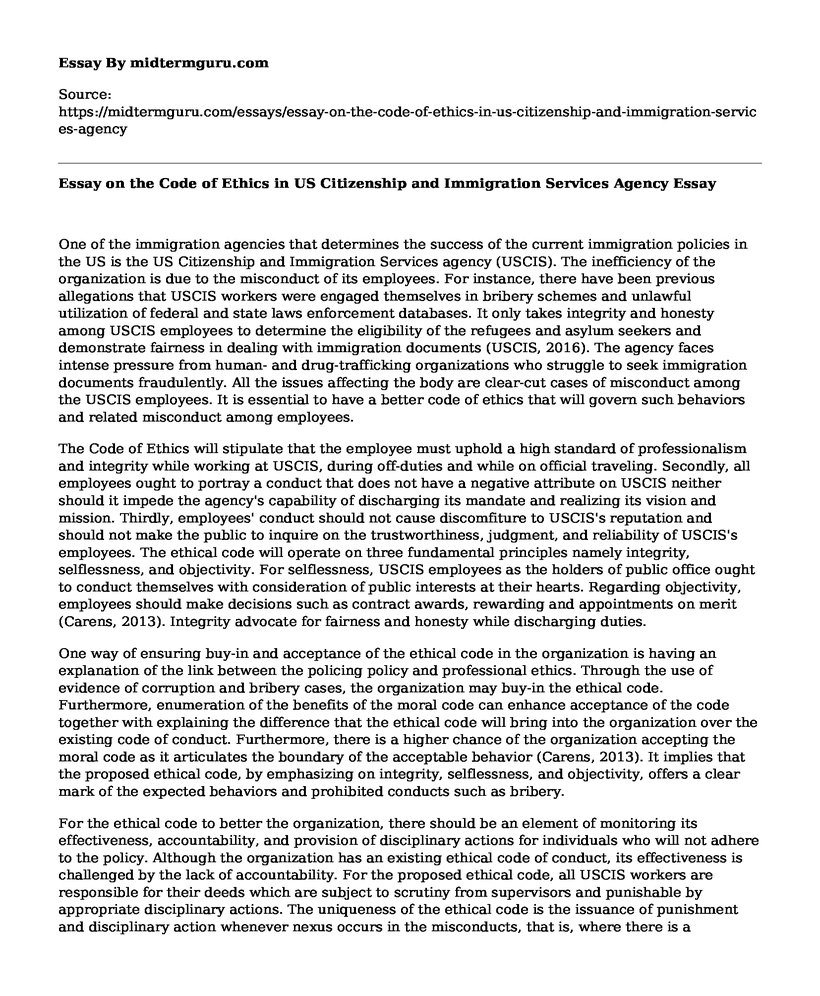One of the immigration agencies that determines the success of the current immigration policies in the US is the US Citizenship and Immigration Services agency (USCIS). The inefficiency of the organization is due to the misconduct of its employees. For instance, there have been previous allegations that USCIS workers were engaged themselves in bribery schemes and unlawful utilization of federal and state laws enforcement databases. It only takes integrity and honesty among USCIS employees to determine the eligibility of the refugees and asylum seekers and demonstrate fairness in dealing with immigration documents (USCIS, 2016). The agency faces intense pressure from human- and drug-trafficking organizations who struggle to seek immigration documents fraudulently. All the issues affecting the body are clear-cut cases of misconduct among the USCIS employees. It is essential to have a better code of ethics that will govern such behaviors and related misconduct among employees.
The Code of Ethics will stipulate that the employee must uphold a high standard of professionalism and integrity while working at USCIS, during off-duties and while on official traveling. Secondly, all employees ought to portray a conduct that does not have a negative attribute on USCIS neither should it impede the agency's capability of discharging its mandate and realizing its vision and mission. Thirdly, employees' conduct should not cause discomfiture to USCIS's reputation and should not make the public to inquire on the trustworthiness, judgment, and reliability of USCIS's employees. The ethical code will operate on three fundamental principles namely integrity, selflessness, and objectivity. For selflessness, USCIS employees as the holders of public office ought to conduct themselves with consideration of public interests at their hearts. Regarding objectivity, employees should make decisions such as contract awards, rewarding and appointments on merit (Carens, 2013). Integrity advocate for fairness and honesty while discharging duties.
One way of ensuring buy-in and acceptance of the ethical code in the organization is having an explanation of the link between the policing policy and professional ethics. Through the use of evidence of corruption and bribery cases, the organization may buy-in the ethical code. Furthermore, enumeration of the benefits of the moral code can enhance acceptance of the code together with explaining the difference that the ethical code will bring into the organization over the existing code of conduct. Furthermore, there is a higher chance of the organization accepting the moral code as it articulates the boundary of the acceptable behavior (Carens, 2013). It implies that the proposed ethical code, by emphasizing on integrity, selflessness, and objectivity, offers a clear mark of the expected behaviors and prohibited conducts such as bribery.
For the ethical code to better the organization, there should be an element of monitoring its effectiveness, accountability, and provision of disciplinary actions for individuals who will not adhere to the policy. Although the organization has an existing ethical code of conduct, its effectiveness is challenged by the lack of accountability. For the proposed ethical code, all USCIS workers are responsible for their deeds which are subject to scrutiny from supervisors and punishable by appropriate disciplinary actions. The uniqueness of the ethical code is the issuance of punishment and disciplinary action whenever nexus occurs in the misconducts, that is, where there is a relationship between service delivery and employee misconducts (Gilman, 2006). According to Gilman (2006), a useful directive and policies for enforcing ethical codes of behavior in workplaces should have a strong association with corrective and disciplinary actions that will discourage the recurrence of similar cases
References
BIBLIOGRAPHY Carens, J. H. (2013). The ethics of immigration. New York: Oxford University Press.
Gilman, S. C. (2006). Ethics Codes and Codes of Conduct as Tools for Promoting an Ethical and Professional Public Service. Washington DC: OECD.
USCIS. (2016). Report USCIS Employee Misconduct. Retrieved from U.S. Citizenship and Immigration Services: https://www.uscis.gov/about-us/report-uscis-misconduct/report-uscis-employee-misconduct
Cite this page
Essay on the Code of Ethics in US Citizenship and Immigration Services Agency. (2021, Jun 02). Retrieved from https://midtermguru.com/essays/essay-on-the-code-of-ethics-in-us-citizenship-and-immigration-services-agency
If you are the original author of this essay and no longer wish to have it published on the midtermguru.com website, please click below to request its removal:
- Analysis of Internal and External Environment of a Company - Paper Example
- Essay on the Auditing of Food Safety Modernization Act (FSMA)
- Top 5 Things to Better Manage Medical Risk in Hospitals - Essay Sample
- Pay for Performance and Compensation Strategy - Research Paper
- Self-Actualization: Maslow's Theory of Motivation and Social Justice - Essay Sample
- Leadership Strategies for Advocacy - Essay Sample
- The Developmental Levels of Leadership - Essay Sample







